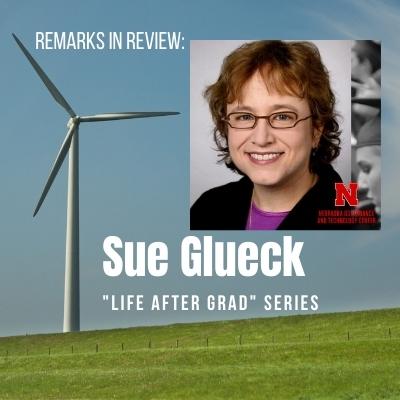Wed, 03/30/2022
The Nebraska Governance and Technology Center and the University of Nebraska College of Law had the pleasure of hosting Sue Glueck, Senior Director of Academic Relations for Microsoft Corporation’s legal department, as the first speaker in their “Life After Grad” series. The series is aimed at helping law graduates who are wondering “what’s next?” after graduation. Glueck discussed her own winding career path, gave students tips on finding satisfaction in their careers and identifying areas of work that match their interests, and provided practical tips for networking.
In Glueck’s experience, it can sometimes be difficult to figure out what we actually enjoy in a work context. Nevertheless, identifying what you find meaningful is ultimately central to work satisfaction. “If you can figure out what you love, you can navigate to it.” Glueck doesn’t discount the value of taking a job that may not be a perfect fit as a credential or a stepping stone to something else, but recommends that grads navigate with some goal in mind – even if that goal evolves along the way.
In order to identify what they truly enjoy, Glueck recommended that students start by getting in touch with their bodies. She led the group in a mindfulness activity where she asked students to think of a negative experience and identify how they carry that emotion in their bodies, followed by the same exercise with a positive experience. While we might become distanced from our underlying emotions by our desire to persevere and achieve, our bodies hold the truth about our feelings, and accessing those underlying emotions can provide us with guidance about what sort of work experiences we truly enjoy.
Glueck also identified a few areas of interest students might consider as fields in which to make a career. Glueck began by offering a full endorsement of the field of privacy, not only because that is the field she loves and within which she has made her career, but because it is an area of active debate where new policies are actively being written — especially within the tech space. Second, artificial intelligence: with AI poised to transform huge aspects of our lives, there are tremendous opportunities for lawyers with the right background to contribute to discussions around the constraints that should govern artificial intelligence. Finally, cybersecurity: Glueck referenced a recent report that indicated that companies have only been able to fill 50% of the cybersecurity positions that they’ve recently made available; even if the position at issue isn’t one that is tailor-made for a lawyer, those skills could still inform the way a law graduate approaches the work and provide future opportunities for professional growth.
Finally, Glueck gave some very practical tips that demystified networking, encouraging students to reach out to individuals who are further along in their career paths and ask for their perspective and guidance; in her experience, individuals are almost always happy to oblige. And once a connection has been made, don’t be afraid to check-in with your contact every 6 months or a year to see what has changed on their end, or ask for a recommendation for another individual to whom they might want to reach out. It’s often these informal connections that lead graduates to try out a new path in their career that could take it in a varied, meaningful direction.
